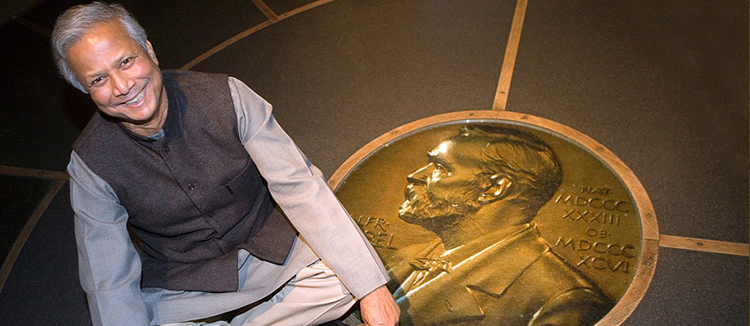
By:
- Christine Clark
Published Date
By:
- Christine Clark
Share This:

Nobel Peace Prize Recipient Muhammad Yunus
Nobel Peace Prize Recipient Muhammad Yunus is All Campus Commencement’s Keynote Speaker
“Banker of the poor” and founder of the global microfinance movement will address all UC San Diego graduates on June 11
Muhammad Yunus, social entrepreneur, economist, founder of the global microfinance movement and Nobel Peace Prize recipient, will serve as the keynote speaker at UC San Diego’s All Campus Commencement on June 11. The event will mark the first time in 16 years that UC San Diego will convene all of its graduating undergraduate and graduate students for a campuswide commencement ceremony.
Yunus, a civil society leader, was awarded the Nobel Peace Prize in 2006 for founding the nonprofit Grameen Bank, and pioneering the concepts of microcredit and microfinance. These loans are given to entrepreneurs who don’t qualify for traditional bank loans. The Grameen Bank, established in Bangladesh, has lent billions of dollars to impoverished people, mostly women, to start their own businesses.
“We are honored to have Muhammad Yunus serve as keynote speaker at our All Campus Commencement, as he embodies UC San Diego’s ideals of public service, social mobility and global citizenship,” said Chancellor Pradeep K. Khosla. “Yunus’s leadership in the microfinance movement has transformed the lives of people around the world, enabling them to reach for their dreams and achieve their goals.”
Yunus’s values and achievements align with the campus’s tradition of service, making him the ideal speaker for UC San Diego, which has been ranked the No. 1 university in the country by Washington Monthly for six years in a row for its contributions to the public good.
Yunus and the Grameen Bank were jointly awarded the Nobel Peace Prize for their efforts to help poor people escape from poverty by providing loans on terms suitable to them and by teaching them a few sound financial principles so they could help themselves. The Norwegian Nobel Committee noted that “lasting peace cannot be achieved unless large population groups find ways in which to break out of poverty” and that “across cultures and civilizations, Yunus and Grameen Bank have shown that even the poorest of the poor can work to bring about their own development.”
In addition to the Nobel Peace Prize, Yunus has received numerous awards including the Presidential Medal of Freedom and the Congressional Gold Medal, two of the highest civilian honors in the United States.
Muhammad Yunus: Redefining Humanity
In public speeches, Yunus has encouraged young people to rediscover themselves––to work not just to earn a living, but to improve the lives of others. His philosophy is that everyone is creative and can be an entrepreneur.
Yunus established the Grameen Bank in Bangladesh in 1983, fueled by the belief that credit is a fundamental human right. His objective was to create economic and social development from below.
From Yunus’s personal loan of small amounts of money to destitute basketweavers in Bangladesh in the mid ‘70s, the Grameen Bank has advanced to the forefront of a burgeoning world movement toward eradicating poverty through microlending. Replicas of the Grameen Bank model operate in more than 100 countries worldwide.
Born in 1940 in the seaport city of Chittagong, in what is now known as Bangladesh, Yunus studied at the country’s Dhaka University and then received a Fulbright scholarship to study economics at Vanderbilt University in the U.S. He received his doctorate in economics from Vanderbilt in 1969 and the following year became an assistant professor of economics at Middle Tennessee State University. Returning to Bangladesh, Yunus headed the economics department at Chittagong University.
From 1993 to 1995, Yunus was a member of the International Advisory Group for the Fourth World Conference on Women, a post to which he was appointed by the United Nations’ secretary general. He has served on the Global Commission of Women’s Health, the Advisory Council for Sustainable Economic Development and the UN Expert Group on Women and Finance.
About UC San Diego’s All Campus Commencement
The All Campus Commencement will include the conferring of degrees for approximately 8,000 undergraduates from all six colleges and graduate students from the Graduate Division, Rady School of Management and School of Global Policy and Strategy. In previous years, UC San Diego students graduated with their college or graduate program in ceremonies that included both the conferring of degrees and the opportunity to walk across stage. This year, the official conferral of degrees by the Chancellor will happen during the All Campus Commencement. Following the All Campus Commencement, the colleges and graduate programs will host personalized graduation ceremonies, where students will walk across stage as their names are read.
The All Campus Commencement is designed to strengthen the sense of community among UC San Diego students and families by providing an opportunity for all graduating students to come together one final time as the Class of 2016. It is set for 10 a.m. on Saturday, June 11 at RIMAC Field.
For more information on UC San Diego’s commencement series, click here.
Share This:
You May Also Like
Stay in the Know
Keep up with all the latest from UC San Diego. Subscribe to the newsletter today.


